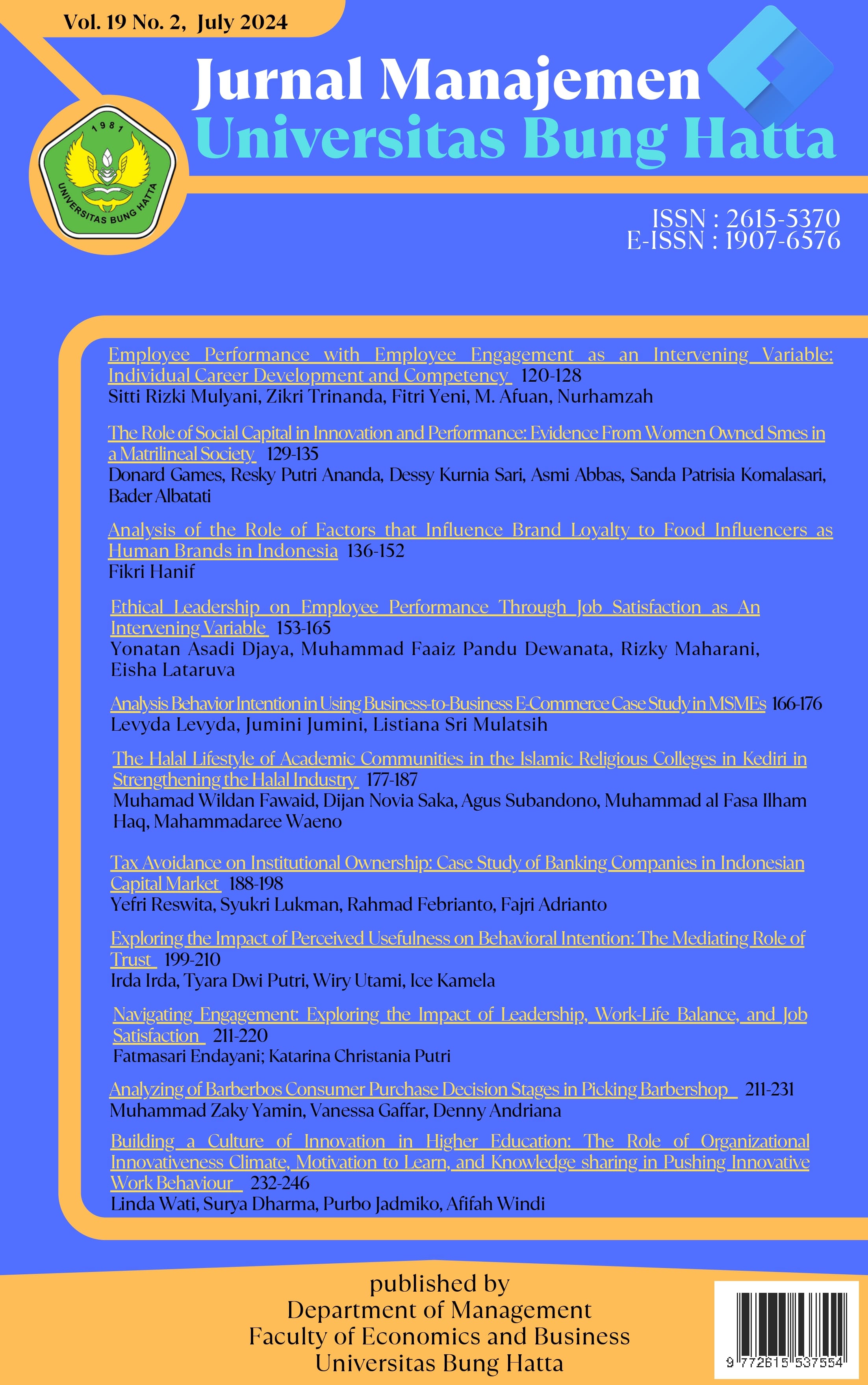Navigating Engagement: Exploring the Impact of Leadership, Work-Life Balance, and Job Satisfaction
DOI:
https://doi.org/10.37301/jmubh.v19i2.24884Keywords:
leadership style, work-life balance, job satisfaction, employee engagementAbstract
This study aims to examine the impact of leadership style, work-life balance, and job satisfaction on employee engagement in Perumda Tirta Kanjuruhan, Malang Regency. Utilizing a quantitative research approach, data were gathered through surveys distributed to employees of Perumda Tirta Kanjuruhan. The sample size was determined using the Slovin formula with a confidence level of 95%. Analysis was conducted employing multiple linear regression. Findings revealed significant effects of leadership style, work-life balance, and job satisfaction on employee engagement in Perumda Tirta Kanjuruhan, Malang Regency. Of the three independent variables, one variable, namely leadership style, had a positive but non-significant impact. This occurs due to several possible reasons. Firstly, the sample size might not have been large enough to detect a significant effect of leadership style on employee engagement. Additionally, the specific leadership styles observed within the organization may not have varied significantly, leading to limited variability in the data. Moreover, other unaccounted-for factors, such as organizational culture or external influences, could have overshadowed the impact of leadership style on employee engagement. Finally, measurement limitations or inaccuracies in assessing leadership style may have contributed to the non-significant findings.
References
literature review. European Journal of Business and Management Research, 5(2).
Tensay, A. T., & Singh, M. (2020). The nexus between HRM, employee engagement and organizational performance of federal public service organizations in Ethiopia. Heliyon, 6(6), 1–15. https://doi.org/10.1016/j.heliyon.2020.e04094
Tiwari, B., & Lenka, U. (2016). Building psychological safety for employee engagement in post-recession. Development and Learning in Organizations: An International Journal, 30(1), 19–22. https://doi.org/10.1108/DLO-05-2015-0044
Tuzovic, S., & Kabadayi, S. (2021). The influence of social distancing on employee well-being: a conceptual framework and research agenda. Journal of Service Management, 32(2), 145–160. https://doi.org/https://doi.org/10.1108/JOSM-05-2020-0140
Usman, M. (2020). Transformational leadership and organizational change: In the context of today’s leader. International Business Education Journal, 13(1), 95–107. https://doi.org/https://doi.org/10.37134/ibej.vol13.1.8.2020
Vasumathi, A. (2018). Work life balance of women employees: a literature review. International Journal of Services and Operations Management, 29 (1), 100–146. https://doi.org/https://doi.org/10.1504/IJSOM.2018.088477
Zhang, T., C. Avery, G., Bergsteiner, H., & More, E. (2014). The relationship between leadership paradigms and employee engagement. Journal of Global Responsibility, 5(1), 4–21.
Downloads
Published
Issue
Section
License
Copyright (c) 2024 Fatmasari Endayani; Katarina Christania Putri

This work is licensed under a Creative Commons Attribution-ShareAlike 4.0 International License.
Authors who publish with Jurnal Manajemen Universitas Bung Hatta agree to the following terms:
- Authors retain copyright and grant the journal right of first publication with the work simultaneously licensed under a Creative Creative Commons Attribution-ShareAlike 4.0 International License that allows others to share the work with an acknowledgement of the work's authorship and initial publication in Jurnal Manajemen Universitas Bung Hatta.
- The author holds the copyright of the submitted and published articles, with the understanding that articles are disseminated under the Creative Commons Attribution-ShareAlike 4.0 International License..
- The editor team is entitled to do the editing in accordance with the guidelines for writing or template in the Jurnal Manajemen Universitas Bung Hatta.
This work is licensed under a Creative Commons Attribution-ShareAlike 4.0 International License.












